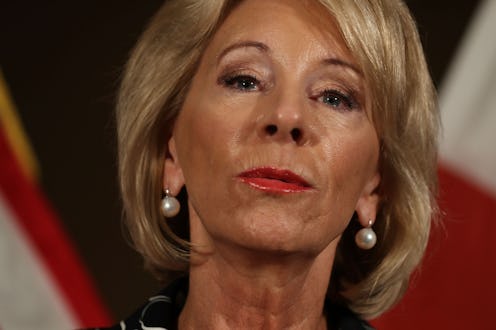News
Betsy DeVos Just Wants Striking Teachers To Take Their "Disagreements" Somewhere Else

Last week, teachers throughout Oklahoma walked out of their classrooms and convened on Capitol Hill to protest school funding cuts. Now, Education Secretary Betsy DeVos responded to the teachers' strike, and she thinks teachers should "keep adult disagreements and disputes in a separate place."
While meeting with leaders of an anti-violence initiative at a middle school in Dallas last Thursday, DeVos told The Dallas Morning News she wasn't in favor of the strikes — which have been happening throughout different states the past few weeks — because she thinks they neglect the students' needs. "I think about the kids," she said. "I think we need to stay focused on what’s right for kids. And I hope that adults would keep adult disagreements and disputes in a separate place, and serve the students that are there to be served."
However, The Washington Post reported that Oklahoma teachers claim their strike, which went into its second week on Monday, is for the benefit of students in the long run. They're demanding, in addition to higher pay, more money to be allocated to the state's schools. For years, Oklahoma has led the country for the deepest cuts to education, according to the Oklahoma Policy Institute.
The teachers' strike has also been condemned by Oklahoma Gov. Mary Fallin. She likened the educators protesting education cuts to "a teenage kid that wants a better car.”
While the teachers in Oklahoma are striking, other community members and local organizations are ensuring the students are taken care of, The Washington Post reported. Schools, churches, and even the Oklahoma City Zoo are providing child care and meals for students who rely on school lunches and breakfasts.
Teachers in Kentucky have also declared a strike, walking out last week and meeting in Frankfurt to protest budget cuts and low wages. Arizona teachers also held a rally for more education funding in late March, and are on the brink of a strike themselves. “I think [a walkout] is an inevitability unless something very drastic happens,” Derek Harris, a teacher at Dietz K-8 school in the Tucson Unified School District, told Tuscon.com.
All of these protests come in the wake of a successful teachers' walkout in West Virginia early in March. Educators and lawmakers finally reached a deal after a nine-day strike. Teachers' salaries were increased by 5 percent, according to The Atlantic, and they agreed on the prospect of policy solutions to their other demands. This set off a chain reaction throughout other school districts in the United States.
"We’re getting support from teachers all over — Alaska, New Mexico, Oklahoma," Annette Jordan, a teacher at Hedgesville High School in West Virginia, told The Atlantic. "These places are saying, 'We know that if they’ve done it in West Virginia, we can do it here too,' so I think [this strike] is going to start spurring some action in other states."
DeVos was also vocal about her stance on the West Virginia strikes. "It’s now day 4 of #WVTeacherStrike," she tweeted at the time. "Whether you believe good teachers deserve better pay — I do — and/or states should be fiscally responsible — I do — we should all agree kids should not suffer for adult squabbles." She went on to say that "kids are directly harmed when they are barred from going to school to learn."
According to The Washington Post, Oklahoma spends 30 percent less on schools than it did a decade ago. School buildings are in disrepair, and textbooks are outdated. And following budget cuts, about 20 percent of Oklahoma school districts have opted for four-day school weeks.
Last month, following pressure from teachers threatening a walkout, the state's lawmakers raised salaries — which ranked 49th in the nation, according to a 2016 report by the National Education Association — an average of about $6,100. They also increased pay for support staff by an average of $1,250 and agreed to invest an additional $50 million in schools, The Washington Post reported.
However, teachers said it wasn't enough to compensate for years of funding cuts. That's when they decided to stage the walkout last week — they're referring to it as a "walkout" because "strikes" are technically illegal for public employees in Oklahoma.
The Oklahoma Education Association's original list of demands included a $10,000 pay raise for teachers; a $5,000 raise for school-support personnel; $200 million over three years in additional local-school funding; a 5 percent cost-of-living increase for retirees; and $500 million over three years to “fully staff state agencies” and raise state employee pay by $7,500 per year.